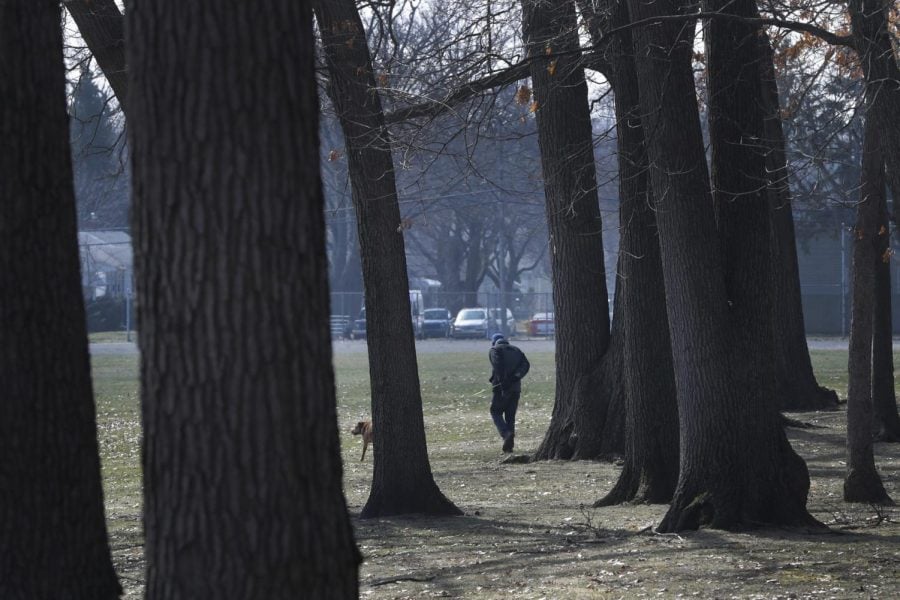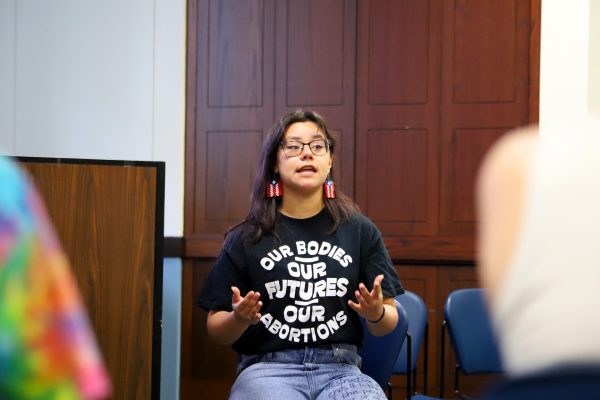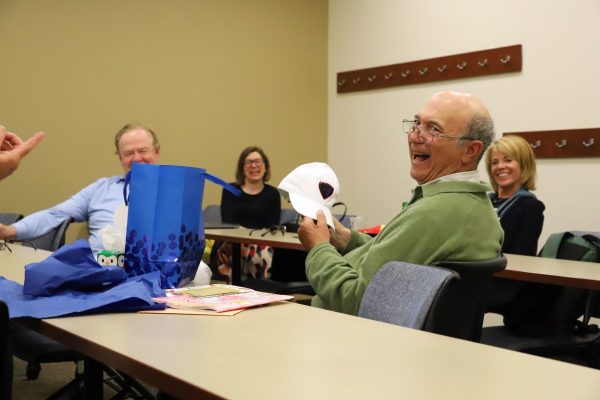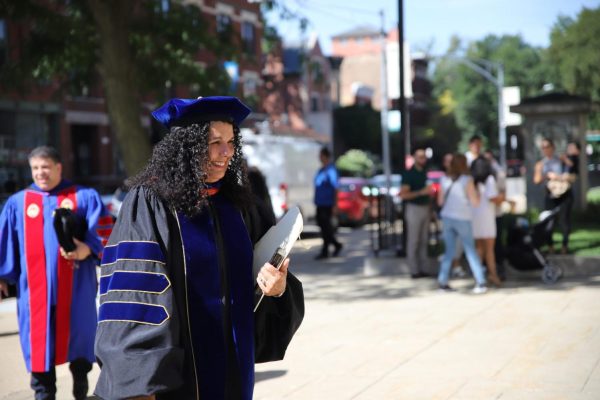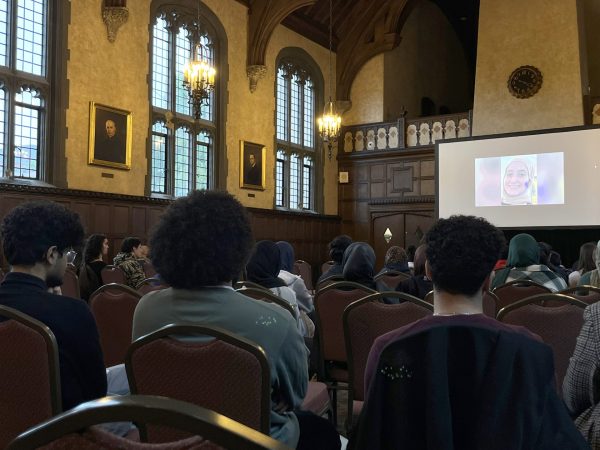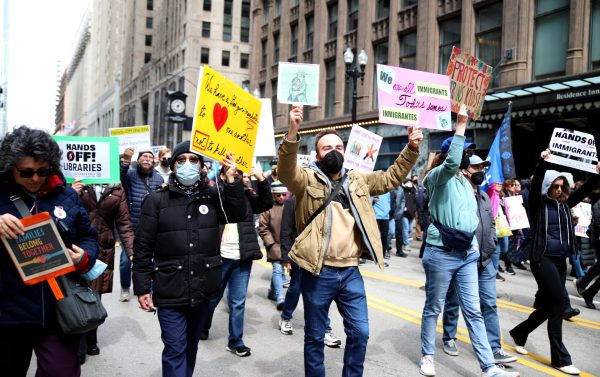How to maintain mental health while social distancing
Credit: AP Photo/Carlos Osorio
A dog is walked, Wednesday, March 25, 2020, in Oak Park, Mich. Health care and government officials have been urging people to get outside and shake off the COVID-19and coronavirus blues for both our mental and physical health.
As COVID-19 continues to spread across the United States, universities around the nation have moved classes online, canceled commencements and closed campus buildings.
The change in daily routine has had major impacts on students and may have adverse psychological effects, according to clinical psychologist and director of the DePaul Family and Community Services Dr. Orson Morrison.
“We will see an increase in stress and anxiety related to being socially isolated from one another and from being homebound,” he said. “A lot of college students are stressed about what this means for internships, course work and for upcoming graduation.”
Multiple Illinois based universities including the University of Illinois, DePaul University, Loyola University and Northwestern have transitioned classes online either temporarily or until the end of the 2019-20 academic year. According to the United Nations, 82.5% of all students around the world have been affected by school and university closures occurring in more than 150 countries.
The Centers for Disease Control and Prevention has recommended people avoid contact with those who are sick as well as communities where the coronavirus is spreading. Many students find themselves stuck in their apartments and homes, only leaving to get essentials while many jobs have also become remote.
Sticking to a routine can be very useful in this situation, Morrison said. It can add some structure to daily schedules that have been disrupted by the virus.
“It is very important to have some sort of regular schedule,” he said. “We at least know that there is going to be something regular, something that we can expect, something rhythmic.”
DePaul senior Joey Cahue said that approaching her day similar to how she would before the pandemic has helped.
“Preparing for the day as if it were any other day has helped a lot,” she said. “My internship is now remote, so I work from home on Monday, Wednesday and Friday. I make sure that I am up by 8 a.m. so I can cook breakfast and get some coffee in my system, since chances are I was up late the night before just wasting time on social media.”
Work has also helped others maintain a routine. DePaul senior Fernanda Aviles discussed how social distancing has affected her daily and work life.
“I actually picked up extra morning shifts at work; that way, I’m able to be up every day by 6,” she said. “I also write down on my white board two to three things I want to accomplish for the day, which I feel has really helped.”
Aviles added that having a routine has helped her quite a bit and recommended that more people should set them.
“It is easy to let the day go by when you have nowhere to go,” she said.
Physical and mental health can both be compromised by social isolation, according to Morrison. He stressed that students, and people in general, should try to integrate exercise into their daily routines.
“Try to replace maladaptive coping strategies with healthier strategies,” he said. “Build in exercise into your daily routine. Be mindful of what you are eating — how much you are eating. Be mindful of sleep patterns — your sleep hygiene. Make sure that you are establishing a regular sleep schedule.”
Morrison listed overeating or undereating and alcohol and substance consumption as two other problems that may arise.
“We have to be careful of falling back on those maladaptive coping strategies, which may be a quick fix to the emotions we are feeling, but over a period of time will be detrimental,” he said.
Aviles said that she has been able to set an exercise routine after struggling at first.
“Since I can’t go to the gym I am forced to work out at home, which was really hard at first given my bed is just a few feet away,” she said. “I definitely had to fight urges to be lazy all day.”
The mental health toll will also be significant, but Morrison recommends different ways people can continue to maintain social interactions.
“I know a lot of people are now transitioning to virtual social connections through FaceTime and teleconference platforms,” he said. “I think it is really important to recognize that we as humans need that social connection.”
Mobile gaming is another way students can stay in touch with their friends.
“FaceTiming my friends helps too,” Cahue said. “We play games on that app called Houseparty and that allows us to video chat and play at the same time.
Morrison identified two clinical psychology concepts that can be useful for people during this time. He said students should practice mindfulness in situations of high stress like these.
“When we get anxious, our minds are typically running a mile a minute,” he said. “We are thinking about the future. We are worrying about what is going to happen next. It really takes us away from living in the present moment.”
It is important in these situations to slow our minds down and see more than just our anxiety, said Morrison.
“Attending to both what is happening inside of us and what is happening around us — there is something reassuring about that,” he said. “It takes us out of that mode of panicking.”
Cognitive restructuring is another concept that Morrison discussed. It calls for people to use reasoning to combat detrimental thinking.
“I have this thought that is really problematic and is generating a lot of anxiety for me,” he said. “Let’s find the evidence for and against this thought. Obviously seeking out credible sources of information like using the CDC website or the WHO website, looking at the stats, the risks, the prevention strategies — all of that may not eradicate our anxiety or fear, but it will bring it down to a more realistic level.”
As more and more experts have started to predict a long term pandemic with multiple stages of social distancing, it is imperative for students to take care of their mental health and make the proper adjustments to this temporary lifestyle.


